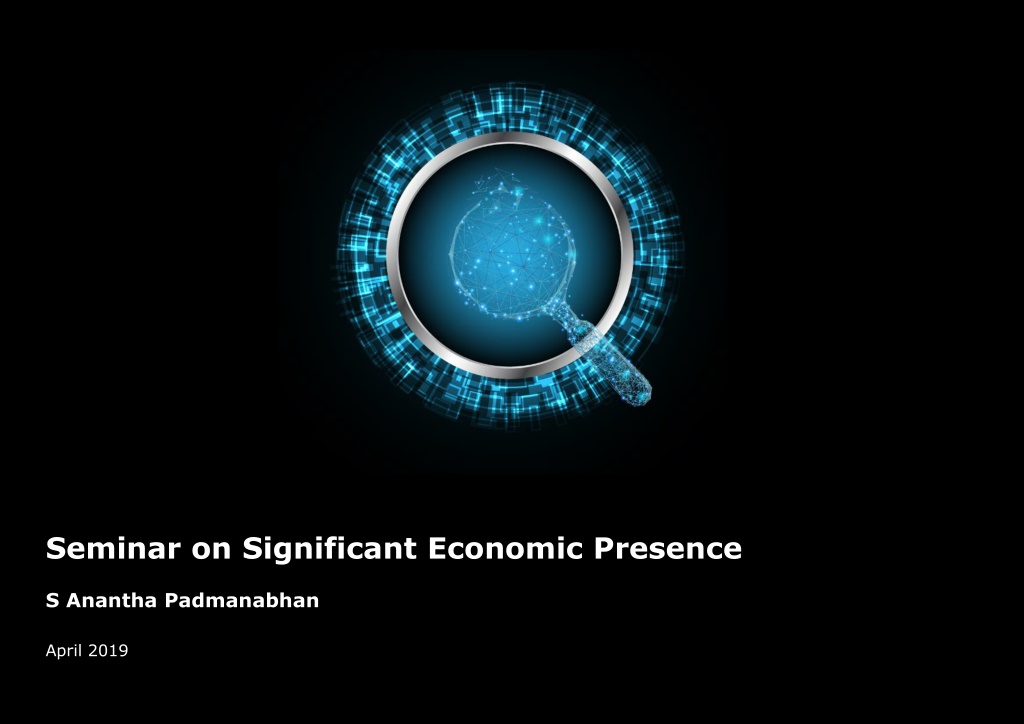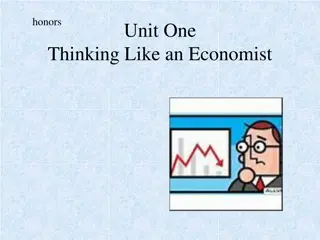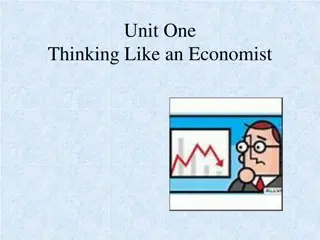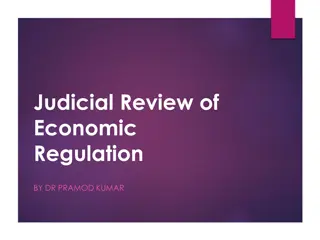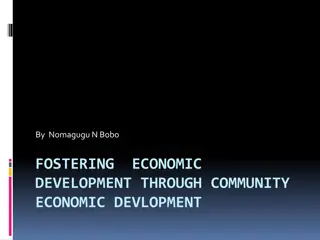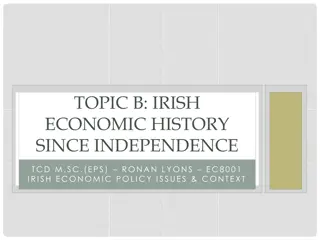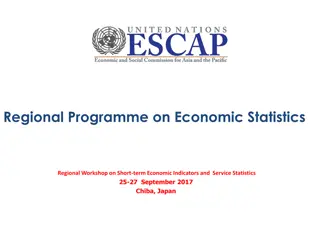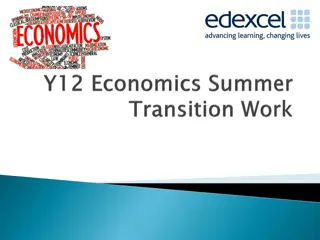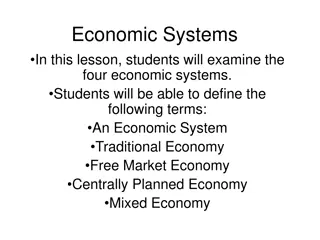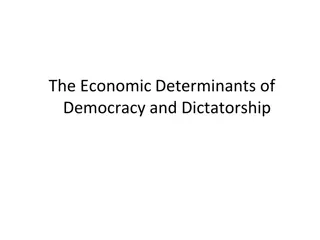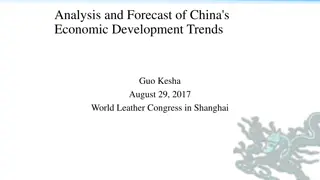Understanding Significant Economic Presence: Key Concepts and Challenges
Explore the concept of Significant Economic Presence (SEP) in the Indian tax laws, including business connections, traditional triggers for Permanent Establishments, challenges in the digital economy, and relevant laws under the Income Tax Act, with insights from case studies and agency relationships. Gain a comprehensive overview of the implications of SEP and its insertion into the tax framework.
Download Presentation

Please find below an Image/Link to download the presentation.
The content on the website is provided AS IS for your information and personal use only. It may not be sold, licensed, or shared on other websites without obtaining consent from the author. Download presentation by click this link. If you encounter any issues during the download, it is possible that the publisher has removed the file from their server.
E N D
Presentation Transcript
Seminar on Significant Economic Presence Headline Verdana Bold S Anantha Padmanabhan April 2019
Significance Economic Presence (SEP) overview Introduction to Business Connection Traditional trigger for a Permanent Establishment Challenges posed by Digital economy Insertion of SEP under the Indian tax laws Case study 2
Law under the Income tax Act Business Connection Relevant extract Income deemed to accrue or arise in India 9. (1) The following incomes shall be deemed to accrue or arise in India : (i) all income accruing or arising, whether directly or indirectly, through or from any business connection in India, or ... business of which operations are confined to purchase of goods in India for export; running a news agency or publishing newspapers, etc. whose activities are confined to collection of news/ views in India for transmission out of India; No income shall be deemed to have accrued in India for NR Being individual/ firm/ company [not having Indian citizen as owner/ partner/ shareholder, respectively] whose operations are confined to shooting of a Cinematographic film in India; Being Foreign company engaged in mining of diamonds, from activities confined to display of uncut and unassorted diamond in CG approved special zone 3
Law under the Income tax Act Business Connection - Agency Relevant extract Business connection includes any business activity carried out through a person, who is acting on behalf of NR, if such person, has and habitually exercises in India; - an authority to conclude contracts on behalf of the NR, unless his activities are limited to the purchase of goods or merchandise for the non-resident; or - habitually concludes contracts; or - habitually plays the principal role leading to conclusion of contracts by that NR and the contracts are - in the name of the NR; or - for the transfer of the ownership of, or for the granting of the right to use, property owned by that NR or that NR has the right to use; or - for the provision of services by the NR; or habitually maintains in India a stock of goods or merchandise from which he regularly delivers goods or merchandise on behalf of the NR; or habitually secures orders in India, mainly or wholly for the NR or its affiliates Business connection does not include any business activity carried out through a broker, general commission agent, etc. having an independent status who is acting in the ordinary course of his business If such broker, etc. works mainly or wholly on behalf of a NR or its affiliates, he shall not be deemed to be an agent of an independent status 4
Business Connection - Agency Rationale for amendments in domestic laws Businessconnection includes business activities carried on by non-resident through dependent agents; Recommended, inter alia, modifications to provide that an agent would also include a person who habitually plays a principal role leading to the conclusion of contracts BEPS recommendations now included in MLI (to which India is a signatory). MLI provisions will, as a result, automatically modify India s DTAs covered by MLI (provided the treaty partner has also opted for the same) Dependent Agent PE provisions under India s DTAA, as modified by MLI, would have become wider than section 9(1)(i) of the Act However, the modified DTA provisions could have been ineffective in view of section 90(2) of the Act since the Act or the DTA whichever is more beneficial to apply Hence, it is proposed to amend the provisions of section 9(1)(i) of the Act to bring in line with MLI provisions 5
Typical business model of non-resident India Outside India Agent Buyer / Customer Non-residnet Seller Costs = $110 (including agent s fees) Seller s profit = $40 Pays price of $150 to seller Typical business models which the non-residents prefer and the implications due to which are discussed in the ensuing slides 7
Provisions under the Double Tax Avoidance Agreement (DTAA) Permanent Establishment Article 5 of OECD Model Convention Article 5(1) - General Rule: The general rule: the PE must be a fixed place of business at the disposal of the enterprise through which the business of the enterprise is carried on. 5(1) Fixed place Article 5(2) - Contains a list of places of business, which prima facie constitute PE, provided they satisfy the requirements of Article 5(1). 5(7) Affiliates 5(2) Specific Article 5(3) - Special rule for construction & installation sites a limitation on Article 5(1). PE Article 5(4) - Lists activities, which may be carried on at a fixed place of business without giving rise to a PE (preparatory and auxiliary services). 5(6) 5(3) Independe nt Agents Construction Article 5(5) - Provides that dependent agents constitute a PE. Article 5(6) - Identifies certain forms of independent agents who do not constitute a PE. 5(5) 5(4) Exclusion from PE Dependent Agent Article 5(7) - States that an associated company will not necessarily give rise to a PE. 8
Concept of PE Fixed place PE Guiding principles The term "permanent establishment" means a fixed place of business through which the business of an enterprise is wholly or partly carried on. The following conditions/ tests must be cumulatively satisfied to trigger a fixed place PE Place of business Test Permanence Test Business Activity Test Disposal Test Place of business covers any premises used for carrying on the business of the enterprise A PE can be deemed to exist only if the place of business has a certain degree of permanence The activities performed through the place of business must constitute the core activities The foreign company must have a certain right of use to the place of business Even where the foreign company does not have a legal right per se over the place of business, the right of use test may be satisfied if the conduct of the foreign company implies a right of use over the premises (for instance, designated cabins for foreign company employees, etc) Further, for a place of business to constitute a PE, the enterprise using it must carry on its business wholly or partly in or through or by it. Place of business may also exist where no premises are available or required for carrying on the business of the enterprise and it simply has a certain amount of space at its disposal. While the exact time period required to constitute a PE has not been defined, PEs have been normally considered to exist in situations where the place of business that maintained for a period longer than 6 months Furthermore, the activity need not be permanent in the sense that there is no interruption of operation, but operations must be carried out on a regular basis Immaterial whether the premises are owned or rented by or otherwise at the disposal of the enterprise. By the word fixed what is contemplated is a reasonable continuity in the activities and linkage to the geographical location. Thus there has to be a reasonable permanence in terms of time to constitute a PE Use of business facilities of another enterprise also covered 9
Permanent Establishment Agency PE Agent Independent Agent Dependent Agent he has and habitually exercises an authority to conclude contracts he habitually maintains stock of goods or merchandise from which he regularly delivers goods or merchandise on behalf of the enterprise he habitually secures orders or or 10
Permanent Establishment Agency PE - Summary NO Person acting on behalf of an enterprise YES NO No PE authority to conclude contracts, habitually concludes contracts/ principal role leading to conclusion of contracts habitually plays the YES NO Legally and economically independent PE YES YES NO Ordinary Course of business 11
Challenges posed by the digital economy 12
Challenges posed by Digital economy to Traditional PE The new generation business models discussed in the BEPS action plan 1 are; - Electronic commerce (B2B, B2C) - Payment services (cash payment solutions, E-wallet/ cyber-wallets, Mobile payment solutions) - App stores - Online advertising - Participative networked platforms Major challenge on account of operations of a digital economy is the difficulty in ring- fencing the economy for tax purposes 13
Google Ireland Case law Google Ireland Limited sells digital services like its online advertising platform to French customers. Google France provides commercial assistance and advice to French customers of Google Ireland under Marketing and Services Agreement (MSA). Google France is then acting as a service provider for Google Ireland and receives a compensation equals to its costs + 8 percent. Google USA Subsidiaries The terms of the MSA clearly provide that Google France shall not execute any contract with the customers The French Tax Authorities (FTA) claimed that the employees of Google France were "de facto" invested with the power to conclude contracts on behalf of Google Ireland claiming that advertising contracts were negotiated and then substantially concluded by them. Therefore, sought to consider Google Ireland having a PE in France. Google Ireland Google France Master Service Agreement Sale support services pursuant to MSA However, the Paris administrative court ruled on a strict interpretation of Article 2 of the France-Ireland tax treaty Google Ireland did not have a PE in France because Google Ireland did not have any fixed place of business in France. French Customers Sale of digital services It did not have a dependent agent in France who was habitually concluding contracts on its behalf with its French customers. The Court ruled that the kind of marketing services that Google France provided to Google Ireland fell under the category of preparatory or auxiliary activities, which is outside the purview of Article 2. The Court pointed out that to achieve the tax authority s desired purpose of taxing Google Ireland, the French Government must modify the PE definition to target such an arrangement. The OECD has extended the criterion for a PE to that of a dependent agent that doesn t have the legal authority to bind an enterprise, but acts on behalf of an enterprise by habitually concluding certain contracts or playing the principal role leading to the conclusion of these contracts. This new definition came about as a result of the OECD s Multilateral Convention to prevent base erosion and profit shifting (BEPS). 14
OECD response to Digital Economy BEPS Action 1 Digital economy (1/2) Article 7(1) of Model Convention Base erosion strategies adopted - Minimization of taxation in the market country by avoiding taxable presence; - Shifting gross profits by shifting trading structures or reducing net profit by maximising deductions; - Low or nil withholding tax at source; - Low or no taxation at the level of recipient via intra-group arrangements; - No current taxation of the low-tax profit at the level of the ultimate parent; 15
OECD response to Digital Economy BEPS Action 1 Digital economy (2/2) Factors to be considered for determining the significant economic presence Revenue based factor Revenue generated as potential indicators of the existence of a significant economic presence. Due consideration required for transactions covered (whether or not to include only revenues generated from digital transactions concluded with in-country); level of the threshold (to prescribe threshold in absolute terms and in local currency); administration of the threshold (ability of the country to identify and measure remote sales activities of the non-resident enterprise). Digital factor - The ability to reach significant numbers of customers. Factors considered to include local domain name and local digital platform Local payment options User-based factors Monthly active users (number of monthly active users on the digital platform that are habitually resident in a given country in a taxable year) Online contract conclusion (conclusion of contracts via a digital platform without the need for the intervention of local personnel or dependent agents) Data collected (the volume of digital content collected) with specific focus on the origin of the data collected, irrespective of the data warehouse. The range of data captured by the threshold would cover also, e.g. user created content, product reviews, and search histories. - Possible combinations of the revenue factor with the other factors captured above 16
ABB FZ LLC Case Law 83 taxmann.com 86 (Bangalore ITAT) - Facts of the case Facts ABB FZ-LLP ( ABBFZ ) is a non-resident company incorporated in UAE and engaged in the business of providing regional service activities for ABB entities in India, Middle-east and Africa. ABB FZ-LLC ABB FZ entered into regional headquarter service agreement with ABB Limited and rendered services. UAE ABB FZ claimed the income received from ABB Limited as exempt income as the Indo-UAE DTAA does not have FTS clause. India Fees for Technical Services for services rendered Since FTS clause has specifically excluded from the treaty, the taxability fall under Article 22 and would be taxable in India only if the entity has a PE in India. Since ABB FZ does not have a PE in India was not liable to be taxed in India. ABB Limited The AO in his order brought out that apart from claiming that its income is not taxable in income in the absence of FTS clause in DTAA and had not proved the non-existence of PE in India. The AO further held that in the absence of FTS clause in DTAA, the local act will prevail and the sums paid will be covered under section 9(i)(vii) and not as per DTAA. DRP confirmed the actions of the AO. 17
ABB FZ LLC Case Law 83 taxmann.com 86 (Bangalore ITAT) ITAT ruling With respect to Service PE: Article 5(1) and 5(2) of India-UAE tax treaty relating to PE are independent clauses. Therefore, the condition of having a fixed place of business under article 5(1) is not required to be satisfied for constituting a PE under Article 5(2). It is generally understood that Service PE is constituted if services are furnished by a foreign company through its employees or other personnel in the source country for a threshold period (say for a period aggregating to six / nine months within any twelve month period). The Tribunal in context of provision of services, held that in the present technology era, where the services, information, consultancy, etc. can flow to the recipient thereof, through virtual modes like email, internet, video conference, etc., the physical presence of employees in India within the stipulated thresholds should not be the sole criteria for determining existence of Service PE. The Tribunal also further held that since the activity of the Taxpayer commenced only in the month of January 2010, the argument of completing 9 months service before March 2010 is implausible and against common sense. Therefore, what is necessary is to satisfy the rendition of services by the personnel or employees of the foreign entity. It was accordingly held that the Taxpayer may have a service PE in India. However, since the India-UAE tax treaty specifies that other Articles of the tax treaty would override Service PE clause, the Tribunal analysed whether the consideration received for rendering services would constitute Royalty. 18
Significant Economic Presence (SEP) Explanation 2A to section 9(1)(i) of ITA Finance Act, 2018 introduced the concept of Significant Economic Presence (SEP) w.e.f. 1-4-2019 The definition of business connection , was clarified to provide that a non-resident s significant economic presence in India shall constitute business connection of the non-resident in India. The significant economic presence for this purpose shall mean- (i) any transaction in respect of any goods, services or property carried out by a non-resident in India including provision of download of data or software in India if the aggregate of paymentsarising from such transaction or transactions during the previous year exceeds the amount as may be prescribed;or (ii) systematic and continuous soliciting of its business activities or engaging in interaction with such number of users as may be prescribed, in India through digital means. Provided that the transactions or activities shall constitute significant economic presence in India, whether or not, (i) the agreement for such transactions or activities is entered in India; or (ii) the non-resident has a residence or place of business in India; or (iii) the non-resident renders services in India: Provided further that only so much of income as is attributable to the transactions or activities referred to in clause (a) or clause (b) shall be deemed to accrue or arise in India. 20
Significant Economic Presence - Section 9(1)(i) Questions? Whether both the clauses of revenue and user to be satisfied in order to trigger SEP or is it enough if one of them is satisfied? Whether the said amendment would be prospective or retrospective? 21
Significant Economic Presence - Section 9(1)(i) Insertion of SEP to Business Connection Significant economic presence defined to mean A new explanation [Explanation 2A] to section 9(1)(i) of the Act was inserted to clarify that the significant economic presence of a non- resident in India shall constitute business connection in India. The agreement is entered in India; transaction in respect of any goods, services or property carried out by a non-resident in India including provision of download of data or software in India provided the revenue therefrom exceeds monetary threshold as may be prescribed (Clause a); (or) The non-resident has a residence or place of business in India; (or) The non-resident renders services in India systematic and continuous soliciting of business activities or engaging in interaction with users (exceeding the number as may be prescribed) in India through digital means (Clause b). Non-resident to constitute SEP whether or not: Insertion Attribution - Only so much of income as is attributable to the specified transactions or activities to be deemed to accrue or arise in India. 22
Significant Economic Presence - Condition A Transactions in respect of goods services or property There is a transaction The transaction is in respect of goods services or property The transaction could include provision of download of data or software The transaction is carried out by a non-resident The transaction is carried out in India The aggregate of payments from such transactions during the previous year exceeds the prescribed amount Condition (a) would be applicable if all above parameters are fulfilled. Scope of Transaction Carried Out in India Does it cover both sale as well as purchase transaction? Is Condition (A) applicable only if transaction carried out in India discussed in the ensuing slide 23
Significant Economic Presence Issues on E-commerce Industry The language of clause (a) causes certain difficulties. It provides that the transaction should be carried out by the non-resident in India. In E-commerce, there can be many transactions where it is difficult to say who has carried out the transactions. For example, a non-resident may maintain a website where it provides for information, entertainment, mobile phone applications, computer programmes & other products / services. Mobile phone or computer users from India may visit the foreign website of the provider, download the App/ software or view the entertainment programme and make necessary payments. In this case, can we say that it is the Indian resident who has carried out the transactions? Or can we say that it is the non-resident who has carried out the transactions? If the non-resident service provider maintains a website and remains passive, who has carried out the transaction? 24
Significant Economic Presence Impact on E-commerce Industry - Examples Clause (a) specifies that the non-resident should carry out the transaction in India. When the non-resident is maintaining a website outside India, can we say that the non-resident has carried out the transaction in India? A foreign television broadcasting company broadcasts programme for the whole world. However, it makes special arrangements for the Indian viewers. Let us say that the broadcaster company is based in Singapore. Its broadcasting satellite is outside Indian geographical limits. The programme appears on the Indian consumer's television. Since the broadcaster has made special arrangements for Indian viewers, can it be said that the non-resident broadcaster has carried out 'transaction in respect of services' in India? 25
Significant Economic Presence Impact on E-commerce Industry - Examples Clause (a) specifies that the non-resident should carry out the transaction in India. When the non-resident is maintaining a website outside India, can we say that the non-resident has carried out the transaction in India? Let me explain this issue by giving a few illustrations: Google has its search engines (farm of servers) outside India. An Indian resident sends a gmail to another person. For this service, the Indian resident is utilising Google's servers. Another Indian resident wants to search for some information on the internet. His search on Google Chrome carries him to the Google server situated outside India. The Indian resident gets his search result and the transaction of such service is completed. Who has carried out the transaction? Is it the Indian resident who has carried out transaction or is it Google who has carried out the transaction? 26
Significant Economic Presence - Condition A Transaction in respect of goods, services or property (1/2) What would constitute Goods Attributes Definition Court Rulings Essential parameters Article 366(12) of the Constitution has defined the word goods as including all material, commodities and articles . There has been several decisions of the Supreme Court on the interpretation of the word goods in the context of different State sales tax enactments. What is essential for an article to become goods is its marketability. It would become goods provided it has the attributes thereof having regard to: The test is not whether the property is tangible or intangible, but whether the concerned item is capable of abstraction, consumption and use and whether it can be transmitted, transferred or delivered, stored, possessed etc. its utility; The word goods has been defined in section 2(7) of the Sale of Goods Act, 1930, as meaning very kind of movable property other than actionable claims and money; and includes stock and shares, growing crops, grass, and things attached to or forming part of the land which are agreed to be severed before sale or under the contract of sale . One of the such decision was the case of H. Anraj v. Government of Tamil Nadu (1986) 1 SCC 414 in which the question was whether sale of lottery ticket was a sale of goods. capable of being bought and sold; and capable of being transmitted, transferred, delivered, stored and possessed. The Supreme Court held that the sale of lottery ticket confers on the purchaser thereof two rights (a) right to participate in the draw, and (b) a right to claim a prize contingent upon his being succeeded in the draw. Goods is manufactured when some raw material is processed to a final marketable product. It was concluded of the two rights, the right to participate was goods for the purposes of levying sales tax. 27
Significant Economic Presence - Condition A Transaction in respect of goods, services or property (2/2) What would constitute Services and Property Property Services ` Property means what belongs to a person exclusive of other and what can be subject of bargain and sale. It includes goodwill, trade marks, licences to use a patent, book debts, options to purchase, life policies and other rights under a contract. The term service has a variety of meanings. It may mean any benefit or any act resulting in promoting interest or happiness. It may be contractual, professional, public, domestic, legal, statutory etc. The concept of service thus is very wide. Property is a term of wide import and every interest is included therein [Ahmed G. H. Arif v. CWT [1970] 76 ITR 471 (SC)]. It must bear a comprehensive import but there must be a right present or contingent, before it can be said that a person has interest in the property [CWT v. Arvind Narottam [1988] 173 ITR 479 (SC)]. How it should be understood and what it means depends on the context in which it has been used in the enactment [Lucknow Development Authority v. M. K. Gupta [1994] 80 Comp. Cas. 714 (SC)] 28
Significant Economic Presence Clause A Questions 1. Should digital means be required for both the clauses? While Condition (b) in Explanation 2A applies only if soliciting or engaging is through "digital means", no such restriction is mentioned in condition (a). In other words, on a literal interpretation, any transaction in respect of goods, services or property whether carried out through digital means or otherwise could result in SEP if the payment threshold is met. 2. Number of transactions vs. Value of the transaction? The aggregate of payments arising from the transactions should exceed the prescribed amount. Unlike Condition (b) what is relevant is the payments from such transactions, and not the number of transactions. 3. What if Non-resident s income from all sources exceeds the prescribed amount? The Condition is not satisfied merely because the non-resident's income from all sources exceeds the prescribed amount. It is satisfied only if the aggregate of payments "arising" from the transactions exceeds the prescribed amount. 29
Significant Economic Presence Clause B Systematic and continuous soliciting of business activities through digital means (1/3) Clause B of explanation 2A to Section 9 (1)(i) of the Act - Systematic and continuous soliciting of business activities or engaging in interaction with such number of users as may be prescribed in India through digital means This clause has two independent activities: Systematic and continuous soliciting of business activities Engaging in interaction 30
Significant Economic Presence Clause B Systematic and continuous soliciting of business activities through digital means (2/3) Systematic Continuous - the term "continuous" has been explained as follows: Systematic is defined as "involving or observing a system acting according to system, regular, methodical, carried on as a regular reprehensible practice" [CIT v. Sakarlal Balabhai [1968] 69 ITR 186 (Guj.) Going on without interruption; uninterrupted in time, sequence or essence [Legal Glossary 2015 by Government of India] Recurring at repeated intervals so as to be of repeated occurrence; interruption Going on uninterrupted in time sequence or essence. [The Law Lexicon by P. Ramanatha Aiyar, 3rd Edn. 2012,] 'systematic' as methodically done, formed or arranged on a regular plan, not haphazard, and in the Oxford Shorter Dictionary, as 'methodical' 'according to a plan', 'not casual or sporadic or unintentional'. [Gurdial Singh Uppal v. CIT [1972] 85 ITR 238 (Punj. & Har.)2] without without interval interruption; or Interaction: Engaging in interaction Communication or direct involvement with someone or something. It connotes to take part in or to be employed in the said continuous transaction. [Dewan Chand Ram Chandra Industries (P.) Ltd. v. UOI [2014] 44 taxmann.com 398/223 Taxman 161 (Delhi)4] an occasion when two or more people or things communicate with or react to each other The words "engaged in the manufacture, production", etc., should normally, therefore, mean continuously occupied in the manufacture as a principal business as distinguished from an occasional participation or single act or casual employment or a mere supervision without physical participation. 31
Significant Economic Presence Clause B Systematic and continuous soliciting of business activities through digital means (3/3) Digital Means: The systematic and continuous soliciting of business activities has to be carried out in India through digital means. The term digital means is not defined in the Explanation. Wikipedia has explained digital media as follows: Digital media are any media that are encoded in machine-readable formats. Digital media can be created, viewed, distributed, modified and preserved on digital electronic devices. Examples of digital media include software, digital images, digital video, video game, web pages and websites, including social media, data and databases, digital audio, such as MP3 and electronic books. Digital media often contrasts with print media, such as printed books, newspapers and magazines, and other traditional or analog media, such as images, movies or audio tapes. 32
Significant Economic Presence Clause B Questions 1. Whether the prescribed number of users is for a year? Systematic and Continuous soliciting of business activities through digital means does not state that the threshold of prescribed users has to be during the year. In other words, if the prescribed number of users is exceeded in year 2019-20, on a literal reading as long as the non-resident engages in interaction in 2020-21, the condition could be regarded as satisfied. This does not appear to be intended and the Rules may clarify that the prescribed number of users should exceed in a previous year. Further, the Condition is not satisfied merely because the number of users exceed the prescribed number. It is satisfied only if the non-resident has "engaged in interaction" with the prescribed number of users. 33
Significant Economic Presence v. Equalization Levy Comparative chart Particulars Significant economic presence Equalization levy Objective To address tax challenges of emerging business models such as digitized business which do not require physical presence of itself or agent To address tax challenges of digital economy Scope and threshold - Transaction in respect of any goods, services or property (including provision of download of data or software) carried out by a non-resident in India (subject to monetary threshold) Consideration for specified services i.e. - online advertisements; - provision space; or for digital advertising - Systematic and continuous soliciting of business activities in India through digital means - any other facility or service for the purpose of online advertisement - Engaging in interaction with users in India (subject to threshold as may be prescribed) through digital means (if exceeds INR0.1 million) Amount to be charged Income as is attributable to such transactions or activities to be deemed to accrue or arise in India Amount of consideration received or receivable for the specified services Rate No specific rate prescribed. Since it constitutes business connection, would be taxed at normal rate 6% Equalization Levy vs. SEP 34
Significant Economic Presence Interplay between SEP and services rendered outside India The proviso (iii) to Explanation 2A states that the transactions or activities shall constitute SEP in India whether or not the non-resident renders services in India. What are the prescribed number of users has to be during the year? On the other hand, both condition (a) and condition (b) require transaction in respect of services or activities in India. Explanation 2A vs. Section 9(1)(vi)/(vii) It appears that the proviso does not extend the scope of the Explanation to services outside India. TDS obligation in case of SEP 35
Significant Economic Presence Explanation 2A vs. Royalty/FTS in Section 9(1)(vi) & (vii) The clause covers download of software and services and the consideration for such software / services could be royalty as defined in Explanation 2 to section 9(1)(vi) or FTS as defined in Explanation 2 to section 9(1)(vii). What are the prescribed number of users has to be during the year? It has been held that royalties / FTS would continue to be taxable under section 9(1)(vi)/9(1)(vii) and will not stand excluded merely because such fees accrue or arise out of any business connection. Explanation 2A vs. Section 9(1)(vi)/(vii) Such fees would not be taxed under section 9(1)(i) as per [Meteor Satellite Ltd. v. ITO [1979] 2 Taxman 424 (Guj.); CIT v. Sri Krishna Oil Complex Ltd. [1997] 107 Taxman 100 (AP); CIT v. Copes Vulcan Inc [1986] 30 Taxman 549 (Mad.); Aeg Aktiengesllschaft v. CIT [2004] 137 Taxman 1 (Kar)] TDS obligation in case of SEP 36
Significant Economic Presence Relevance of amendment vis- -vis Indian tax treaties A provision corresponding to the amended provision is not found in a DTAA entered into by India. What are the prescribed number of users has to be during the year? Hence, in case of a non-resident residing in a country with whom India has a DTAA and who complies with the requirements of section 90(4)/(5), the aforesaid provision will not apply till the relevant DTAA is amended. This is also clarified by the Memorandum, which states that "unless corresponding modifications to PE rules are made in the DTAAs, the cross border business profits will continue to be taxed as per the existing treaty rules." Explanation 2A vs. Section 9(1)(vi)/(vii) However, the widened definition of business connection under Explanation 2A will be relevant in case of non- residents based in a country with which India does not have a DTAA. TDS obligation in case of SEP 37
Significant Economic Presence Representative Assessee under Section 163 of the Act vs. SEP Section 163(1) provides that an agent in relation to a non-resident includes any person in India who has any business connection with the non-resident or from or through whom the non-resident is in receipt of any income whether directly or indirectly. What are the prescribed number of users has to be during the year? On a literal reading, every person who makes payment to the non-resident in respect of any transaction referred to in Explanation 2A would become a representative assessee for the non-resident. Explanation 2A vs. Section 9(1)(vi)/(vii) TDS obligation in case of SEP 38
Significant Economic Presence Taxes deduction at source In view of the extended scope of taxable income of a non-resident, a payer will have to be mindful of his obligation to deduct tax under section 195. a) Documentation requirement a) Ruling from tax department Explanation 2A vs. Section 9(1)(vi)/(vii) TDS obligation in case of SEP 39
Significant Economic Presence - Section 9(1)(i) Safeguards: Inclusion of SEP in the ITA will not impact taxation of non-residents to whom tax treaties apply. This is for the reason that India s existing treaties contain the conventional concept of permanent establishment (PE) for taxing business profits of a non-resident and the ITA amendment will not be read into the tax treaties unless they are amended. Revenues and users not exceeding thresholds as may be prescribed, to remain outside of SEP Illustratively, which transactions may be covered? Who is impacted ? Non-resident carrying on specified activities beyond thresholds may be prescribed Sale or purchase of goods, services or property Any transaction involving download of data or software in India (like in-app purchases) Non-residents who do not have tax treaty benefits are directly impacted Provision of online training / gaming services Provision of services of streaming of e-content (audio / video) Non-residents who have tax treaty benefits need to consider consequential obligation, if any Interaction with customers such as for trouble shooting, etc Websites, online database, cloud storage and computing services, with significant user base in India 40
Significant Economic Presence - Section 9(1)(i) Key Consideration Threshold of revenue and users to be decided after consultation with stakeholders Non-treaty jurisdictions to be impacted by the proposed amendment Cross border business profits to continue to be taxed as per existing treaty rules till the DTAAs are modified India to re-negotiate existing DTAAs for inclusion of the new nexus rule The proposed amendment is in lines with the recommendations under BEPS Action Plan 1 on addressing tax challenges of the digital economy The Central Board of Direct Taxes ( CBDT ) in order to frame the Income-tax Rules for applicability of Significant Economic Presence through notification dated 13 July 2018 has invited the suggestion / comments of stakeholders and general public in relation to Revenue threshold and threshold for number of users 41
Significant Economic Presence Some recent developments around the world Israel step towards SEP Israel Tax Authority published a circular which addresses taxation of foreign companies that operate in Israel through e-commerce and online services. SEP is defined in reference to various illustrative digital factors . European Union (EU) s proposal for taxation of Significant Digital Presence (SDP) EU proposes to establish a taxable nexus of a digital business in member state based on revenue, number of users / contracts for a digital services - digitally sold goods proposed to be excluded 42
Significant Economic Presence Key takeaways Widely worded provision covers in its ambit all provision of goods / Administrative and practical challenges on implementation Israel step towards SEP services by a non-resident Israel Tax Authority published a circular which addresses taxation of foreign companies that operate in Israel through e-commerce and online services. SEP is defined in reference to various illustrative digital factors . European Union (EU) s proposal for taxation of Significant Digital Presence (SDP) on business activities in /with India, should review their position on taxability and compliances Non-residents carrying EU proposes to establish a taxable nexus of a digital business in member state based on revenue, number of users / contracts for a digital services - digitally sold goods proposed to be excluded Heightened scrutiny assessment risk and a clarification on potential prosecution risk for non- filing of tax return is required Clarifications required on several operational aspects and compliance obligation set to rise, like filing of tax return in case the transaction is covered by SEP, but not taxable under the treaty 43
Case Study 1 45
Case Study 1 Facts X Co. incorporated outside India, is engaged in the business of providing entertainment content online (such as Netflix, Amazon Prime Video etc.) to subscribers worldwide, including India. The server of X Co. are located in a country outside India. X Co. purchases content from media houses within and outside India and maintains a media library. To access the online entertainment content, subscribers in India are required pay subscription fees directly to X Co. outside India. Operates and stores content in servers outside India X Co. (State R) Content purchased from providers outside India Outside India India Content purchased from providers within India Indian subscribers accessing the content in India Issues to be examined Characterization of subscription fee received by X Co. as Royalty under the Act? Post implementation of SEP, whether income earned by X Co. would fall within the purview of business connection ? Can the transaction of purchase of content by X Co. from Indian media houses result in triggering of SEP? Assume that X Co. does not have a PE in India 46
Case Study 1 Discussion In terms of Explanation 2 to Section (9)(1)(vi) of the Act, payment of subscription fee to X Co. by Indian subscribers may not be classified as royalty . Also, the Indian subscribers access the online content for their personal use and there is no commercial exploitation of online content by the Indian subscribers. Prior to SEP amendment, X Co. not to have a business connection in India. Thus, subscription fee not taxable in India. ---------------------------------------------------------------------------------------------------------- The definition of SEP encompasses any transaction in respect to any goods, services or property carried on by the non- resident including provision of download of data or software in India would constitute a business connection in India. Accordingly, subscription fee earned by X Co. may fall within the purview of business connection under the provisions of Section 9 of the Act (as amended by Finance Act, 2018). ---------------------------------------------------------------------------------------------------------- The extended definition encompasses any transactions in respect to any goods, services or property carried on by the non-resident . What should be covered within the term transaction requires clarification. Whether it would include only revenue generating transactions such as sales to Indian customers or would it include other transactions such as procurement as well needs to be clarified. 47
Case Study 2 48
Facts Case Study 2A X Co. incorporated outside India, develops a mobile gaming application based on augmented reality (namely Pokemon Go) using google maps plotting. Server of X Co. is outside India. The gaming application is accessible to subscribers across globe, including India, using Android / iOS supported handheld devices. X Co. does not charge any subscription / download fee from the subscribers. To enhance user experience, X Co. issues in game currency for purchase of poke balls and also sells gadgets through gaming application. Payment for issue of in game currency and virtual goods / gadgets is remitted directly to X Co outside India. X Co (State J) Purchase of: - In game currency (poke coins, etc.) - Gadgets (Pokemon Go Plus) Outside India India Indian subscribers Issues to be examined Characterization of payment of virtual goods and gadgets received by X Co. under the Act? Post implementation of SEP, whether income earned by X Co. would fall within the purview of business connection ? 49
Case Study 2A Discussion In terms of Section (9)(1)(vi) and (vii) of the Act, payment for purchase of virtual goods / gadgets received by X Co. from Indian subscribers may not be classified as royalty or fee for technical services under the Act. Prior to SEP amendment, X Co. not to have a business connection in India. Thus, payment received by X Co. for sale of virtual goods / gadgets not taxable in India. ---------------------------------------------------------------------------------------------------------- The definition of SEP encompasses any transaction in respect to any goods, services or property carried on by the non- resident including provision of download of data or software in India would constitute a business connection in India. Accordingly, income earned by X Co. may trigger business connection under the provisions of Section 9 of the Act (as amended by Finance Act, 2018). However, the position needs to be revisited once the rules / threshold with regard to SEP are prescribed. 50
